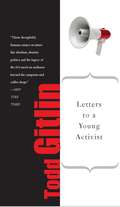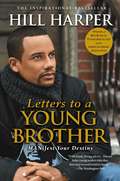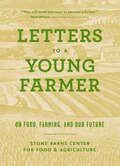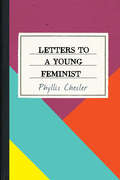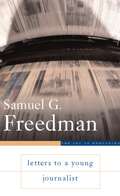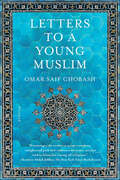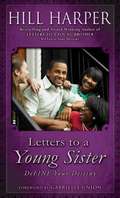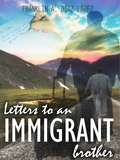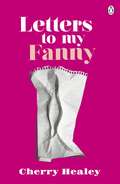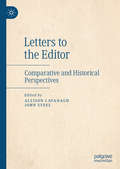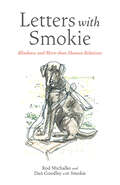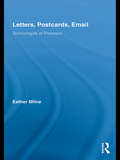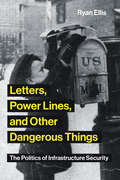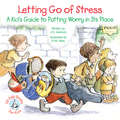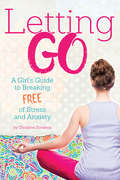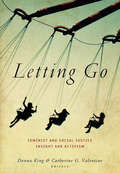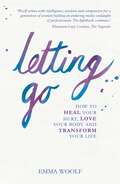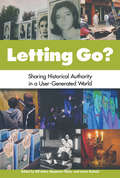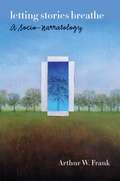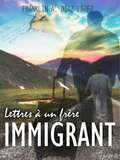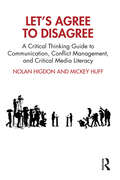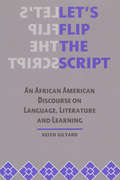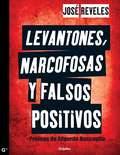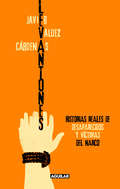- Table View
- List View
Letters to a Young Activist
by Todd Gitlin"Be original. See what happens. " So Todd Gitlin advises the young mind burning to take action to right the wrongs of the world but also looking for bearings, understanding, direction, and practical examples. In Letters to a Young Activist, Todd Gitlin looks back at his eventful life, recalling his experience as president of the formidable Students for a Democratic Society in the '60s, contemplating the spirit of activism, and arriving at some principles of action to guide the passion and energy of those wishing to do good. He considers the three complementary motives of duty, love, and adventure, and reflects on the changing nature of idealism and how righteous action requires realistic as well as idealistic thinking. And he looks forward to an uncertain future that is nevertheless full of possibility, a future where patriotism and intelligent skepticism are not mutually exclusive. Gitlin invites the young activist to enter imaginatively into some of the dilemmas, moral and practical, of being a modern citizen--the dilemmas that affect not only the problems of what to think but also the problems of what to love and how to live.
Letters to a Young Brother: Manifest Your Destiny
by Hill HarperOffering inspirational advice in a down-to-earth style, this unique compilation of letters provides wisdom, guidance, and heartfelt insight to help readers chart their own paths to success. Based on the author's motivational speaking at inner-city schools across the country, the letters deal with the tough issues that face young people today. Bombarded with messages from music and the media, Harper set out to dispel the stereotypical image of success that young people receive today and instead emphasizes alternative views of what it truly means to be a successful male, such as educational and community achievements and self-respect. Intended to provide this frequently regarded "lost generation" of young men with words of encouragement and guidance, Harper's deep-rooted passion regarding the plight of today's youth drove him to write this book, sure to change the lives of readers for years to come.
Letters to a Young Farmer: On Food, Farming, and Our Future
by Stone Barns Center for Food and AgricultureAn agricultural revolution is sweeping the land. Appreciation for high-quality food, often locally grown, an awareness of the fragility of our farmlands, and a new generation of young people interested in farming, animals, and respect for the earth have come together to create a new agrarian community. To this group of farmers, chefs, activists, and visionaries, Letters to a Young Farmer is addressed. Three dozen esteemed leaders of the changes that made this revolution possible speak to the highs and lows of farming life in vivid and personal letters specially written for this collaboration.Barbara Kingsolver speaks to the tribe of farmers—some born to it, many self-selected—with love, admiration, and regret. Dan Barber traces the rediscovery of lost grains and foodways. Michael Pollan bridges the chasm between agriculture and nature. Bill McKibben connects the early human quest for beer to the modern challenge of farming in a rapidly changing climate.Letters to a Young Farmer is a vital road map of how we eat and farm, and why now, more than ever before, we need farmers.
Letters to a Young Feminist (Women's Studies)
by Phyllis CheslerLETTERS TO A YOUNG FEMINIST is a visionary message from a leading feminist to the next generation of feminists. Phyllis Chesler discusses basic aspects of feminism, explains feminism's relevance in a world that has taken it for granted and derided it, and helps the next generation reclaim feminism for itself. Chesler examines sisterhood, sex, families, motherhood, work, feminist heroism, and the economics of power, providing guidance to the generation to come.
Letters to a Young Journalist
by Samuel G. FreedmanOver the course of a thirty-year career, Samuel Freedman has excelled both at doing journalism and teaching it, and he passionately engages both of these endeavors in the pages of this book. As an author and journalist, Freedman has produced award-winning books, investigative series, opinion columns, and feature stories and has become a specialist in a wide variety of fields. As a teacher, he has shared his expertise and experience with hundreds of students, who have gone on to succeed in both print and broadcast media. In Letters to a Young Journalist, Freedman conducts an extended conversation with young journalists-from kids on the high school paper to graduates starting their first jobs. Whether he's talking about radio documentaries or TV news shows, Internet blogs, or backwater beats, shoeleather research or elegant prose, his goal is to explore the habits of mind that make an excellent journalist. It is no secret that journalism's mission is seriously imperiled these days, and Freedman's provocative ideas and fascinating stories offer students and journalists at all levels of experience wise guidance and professional inspiration.
Letters to a Young Muslim
by Omar Saif Ghobash**A New York Times Editor's Pick**From the Ambassador of the UAE to Russia comes Letters to a Young Muslim, a bold and intimate exploration of what it means to be a Muslim in the twenty-first century. In a series of personal and insightful letters to his sons, Omar Saif Ghobash offers a vital manifesto that tackles the dilemmas facing not only young Muslims but everyone navigating the complexities of today’s world. Full of wisdom and thoughtful reflections on faith, culture and society. This is a courageous and essential book that celebrates individuality whilst recognising it is our shared humanity that brings us together. Written with the experience of a diplomat and the personal responsibility of a father; Ghobash’s letters offer understanding and balance in a world that rarely offers any. An intimate and hopeful glimpse into a sphere many are unfamiliar with; it provides an understanding of the everyday struggles Muslims face around the globe. *One of Time's Most Anticipated Books of 2017, a Bustle Best Nonfiction Pick for January 2017, a Chicago Review of Books Best Book to Read in January 2017, a Stylist Magazine Best Book of 2017, included in New Statesman's What to Read in 2017*
Letters to a Young Sister: DeFINE Your Destiny
by Hill HarperThe New York Times bestselling book of inspirational advice and wisdom for young women from the powerhouse public speaker, star of CSI: NY, and bestselling author of Letters to a Young Brother<P> * Does life sometimes seem so much harder for girls? <P> * Do you ever feel insecure, pressured, or confused? <P> * Do you wish you had someone to give you honest advice on topics like boys, school, family, and pursuing your dreams? <P> * Do you want to make a positive impact on the world, but don't even know how to begin? <P> In the follow-up to his award winning national bestseller, Letters to a Young Brother, actor and star of CSI: NY shares powerful wisdom for young women everywhere, drawing on the courageous advice of the female role models who transformed his life. <P> Letters to a Young Sister unfolds as a series of letters written by older brother Hill to a universal young sister. She's up against the same challenges as every young woman: from relating to her parents and dealing with peer pressure, to juggling schoolwork and crushes and keeping faith in the face of heartache. Hill offers guidance, encouragement, personal stories, and asks his female friends to help answer some truly tough questions. Every young sister needs to know that it's okay to dream big and to deFINE her own destiny. This is a book that will educate, uplift and inspire. <P> Including original contributions from: <P> Michelle Obama * Angela Basset * Ciara * Tatyana Ali * Eve * Malinda Williams * Chanel Iman * Kim Porter * and many more.
Letters to an immigrant brother
by Franklin A. Díaz LárezAre you planning of leaving your country? Do you want to start a new life in another place in the world? Do you know what you will face? A text written in the form of entertaining letters addressed to a brother who dreams of emigrating. The brother is raising his doubts and questions, and the author answers them one by one in a simple, clear and transparent language, trying so that he becomes aware of the obstacles and difficulties that await him, on the one hand, and on the another, of the multiple opportunities that arise, and that by emotion or ignorance is not able to foresee.
Letters to my Fanny
by Cherry HealeyHow much more fun in life could I have had if I'd just stopped worrying so much and stopped beating myself up?In this book, Cherry reveals the things she wishes her mother had told her, through a series of hilarious anecdotes and excruciating confessions.Each chapter opens with a letter to a different body part: 'Letters to my Fanny' covers sex, orgasms and periods; 'Letters to my Brain' covers education, memory and media; 'Letters to my Tummy' covers crop-tops, pregnancy and sit-ups.This wonderfully warm, funny and candid book is a collection of hopeful dispatches from the frontline of girlhood - an impassioned plea to stop piling pressure on girls and young women and allow them to get on with their lives without having to mind the thigh gap . . .
Letters to the Editor: Comparative and Historical Perspectives
by John Steel Allison CavanaghThis book provides an account of current work on letters to the editor from a range of different national, cultural, conceptual and methodological perspectives. Letters to the editor provide a window on the reflexive relationship between editorial and readership identities in historical and international contexts. They are a forum through which the personal and the political intersect, a space wherein the implications of contemporaneous events are worked out by citizens and public figures alike, and in which the meaning and significance of unfolding media narratives and events are interpreted and contested. They can also be used to understand the multiple and overlapping ways that particular issues recur over sometimes widely distinct periods. This collection brings together scholars who have helped open up letters to the editor as a resource for scholarship and whose work in this book continues to provide new insights into the relationship between journalism and its publics.
Letters with Smokie: Blindness and More-than-Human Relations
by Rod Michalko Dan GoodleyLeave it to a dog to put the “human” back in “humanities” In September 2020, Rod Michalko wrote to friend and colleague Dan Goodley, congratulating him on the release of his latest book, Disability and Other Human Questions. Joking that his late guide dog, Smokie, had taken offense to the suggestion that disability was purely a human question, Michalko shared a few thoughts on behalf of his dog. When Goodley wrote back—to Smokie—so began an epistolic exchange that would continue for the next seven months. As the COVID-19 pandemic swept across the world and the realities of lockdown-imposed isolation set in, the Smokie letters provided the friends a space in which to come together in a lively exploration of human-animal relationships and to interrogate disability as disruption, disturbance, and art. Just as he did in life, Smokie guides. In these pages, he offers wisdom about the world, love, friendship, and even The Beatles. His canine observations of human experience provide an avenue into some of the ways blindness might be reconceptualized and “befriended.” Uninhibited by the trappings of traditional academic inquiry, Michalko and Goodley are unleashed, free to wander, to wonder, and to provoke within the bonds of trust and respect. Funny and thoughtful, the result is a refreshing exploration and re-evaluation of learned cultural misunderstandings of disability.
Letters, Postcards, Email: Technologies of Presence (Routledge Research in Cultural and Media Studies)
by Esther MilneIn this original study, Milne moves between close readings of letters, postcards and emails, and investigations of the material, technological infrastructures of these forms, to answer the question: How does presence function as an aesthetic and rhetorical strategy within networked communication practices? As her work reveals, the relation between old and new communication systems is more complex than allowed in much contemporary media theory. Although the correspondents of letters, postcards and emails are not, usually, present to one another as they write and read their exchanges, this does not necessarily inhibit affective communication. Indeed, this study demonstrates how physical absence may, in some instances, provide correspondents with intense intimacy and a spiritual, almost telepathic, sense of the other’s presence. While corresponding by letter, postcard or email, readers construe an imaginary, incorporeal body for their correspondents that, in turn, reworks their interlocutor’s self-presentation. In this regard the fantasy of presence reveals a key paradox of cultural communication, namely that material signifiers can be used to produce the experience of incorporeal presence.
Letters, Power Lines, and Other Dangerous Things: The Politics of Infrastructure Security (Infrastructures)
by Ryan EllisAn examination of how post-9/11 security concerns have transformed the public view and governance of infrastructure.After September 11, 2001, infrastructures—the mundane systems that undergird much of modern life—were suddenly considered “soft targets” that required immediate security enhancements. Infrastructure protection quickly became the multibillion dollar core of a new and expansive homeland security mission. In this book, Ryan Ellis examines how the long shadow of post-9/11 security concerns have remade and reordered infrastructure, arguing that it has been a stunning transformation. Ellis describes the way workers, civic groups, city councils, bureaucrats, and others used the threat of terrorism as a political resource, taking the opportunity not only to address security vulnerabilities but also to reassert a degree of public control over infrastructure. Nearly two decades after September 11, the threat of terrorism remains etched into the inner workings of infrastructures through new laws, regulations, technologies, and practices. Ellis maps these changes through an examination of three U.S. infrastructures: the postal system, the freight rail network, and the electric power grid. He describes, for example, how debates about protecting the mail from anthrax and other biological hazards spiraled into larger arguments over worker rights, the power of large-volume mailers, and the fortunes of old media in a new media world; how environmental activists leveraged post-9/11 security fears over shipments of hazardous materials to take on the rail industry and the chemical lobby; and how otherwise marginal federal regulators parlayed new mandatory cybersecurity standards for the electric power industry into a robust system of accountability.
Letting Go of Stress
by R. W. Alley J. S. JacksonChildren aren't immune to stress. Kids are especially prone to feel fear before stressful events in their lives. Family, school, and team sports' schedules have been crammed into their daily activities so extensively that many children are robbed of their free recreational "growth" time, and an alarming number of kids are experiencing high levels of stress because of this. All of these realities can lead to our children having the same kinds of fears and concerns we adults have, especially about things they often have no control over. In this invaluable book, author J. S. Jackson helps children explore attitudes and ideas to try and diminish some of the stress they feel in their lives.
Letting Go: A Girl's Guide to Breaking Free of Stress and Anxiety
by Christine FonsecaDo you ever feel like you'll never be perfect? Do you worry that what you say or do or wear will be how people remember you? It's time to let go of those worries and embrace who you are. Letting Go: A Girl's Guide to Breaking Free of Stress and Anxiety has everything you need to help you understand and manage the very real pressures you're facing from life. Designed to provide strategies for managing stress and anxiety, this book is filled with practical evidence-based advice and stories from teen and young adult women like you who have found ways to manage their anxieties. Every chapter features a discussion of different types of stress and anxiety so you can understand better what you're experiencing, activities to help you remember all the things you love about yourself and to help you understand yourself better, strategies for combating both stress and anxiety, and a stories of other girls who've learned to move past their stress and love their lives— and themselves — to the fullest.
Letting Go: Feminist and Social Justice Insight and Activism
by Donna King Catherine G. ValentineAt a time when women are being exhorted to "lean in" and work harder to get ahead, Letting Go: Feminist and Social Justice Insight and Activism encourages both women and men to "let go" instead. The book explores alternatives to the belief that individual achievement, accumulation, and attention-seeking are the road to happiness and satisfaction in life. Letting go demands a radical recognition that the values, relationships, and structures of our neoliberal (competitive, striving, accumulating, consuming, exploiting, oppressive) society are harmful both on a personal level and, especially important, on a social and environmental level.There is a huge difference between letting go and "chilling out." In a lean-in society, self-care is promoted as something women and men should do to learn how to "relax" and find a comfortable work-life balance. By contrast, a feminist letting-go and its attendant self-care have the potential to be a radical act of awakening to social and environmental injustice and a call to activism.
Letting Go: Feminist and Social Justice Insight and Activism
by UnknownAt a time when women are being exhorted to "lean in" and work harder to get ahead, Letting Go: Feminist and Social Justice Insight and Activism encourages both women and men to "let go" instead. The book explores alternatives to the belief that individual achievement, accumulation, and attention-seeking are the road to happiness and satisfaction in life. Letting go demands a radical recognition that the values, relationships, and structures of our neoliberal (competitive, striving, accumulating, consuming, exploiting, oppressive) society are harmful both on a personal level and, especially important, on a social and environmental level. There is a huge difference between letting go and "chilling out." In a lean-in society, self-care is promoted as something women and men should do to learn how to "relax" and find a comfortable work-life balance. By contrast, a feminist letting-go and its attendant self-care have the potential to be a radical act of awakening to social and environmental injustice and a call to activism.
Letting Go: How to Heal Your Hurt, Love Your Body and Transform Your Life
by Emma WoolfExploring the issues of love, loss, healing and happiness, this manifesto for freedom from one of feminism’s liveliest voices will guide you on the path to feeling newly, truly confident.
Letting Go?: Sharing Historical Authority in a User-Generated World
by Bill Adair Benjamin Filene Laura KoloskiLetting Go? investigates path-breaking public history practices at a time when the traditional expertise of museums seems challenged at every turn-by the Web and digital media, by community-based programming, by new trends in oral history and by contemporary art. In this anthology of 19 thought pieces, case studies, conversations and commissioned art, almost 30 leading practitioners such as Michael Frisch, Jack Tchen, Liz Sevcenko, Kathleen McLean, Nina Simon, Otabenga Jones and Associates, and Fred Wilson explore the implications of letting audiences create, not just receive, historical content. Drawing on examples from history, art, and science museums, Letting Go? offers concrete examples and models that will spark innovative work at institutions of all sizes and budgets. This engaging new collection will serve as an introductory text for those newly grappling with a changing field and, for those already pursuing the goal of "letting go," a tool for taking stock and pushing ahead.
Letting Stories Breathe: A Socio-Narratology
by Arthur W. FrankStories accompany us through life from birth to death. But they do not merely entertain, inform, or distress us—they show us what counts as right or wrong and teach us who we are and who we can imagine being. Stories connect people, but they can also disconnect, creating boundaries between people and justifying violence. In Letting Stories Breathe, Arthur W. Frank grapples with this fundamental aspect of our lives, offering both a theory of how stories shape us and a useful method for analyzing them. Along the way he also tells stories: from folktales to research interviews to remembrances. Frank’s unique approach uses literary concepts to ask social scientific questions: how do stories make life good and when do they endanger it? Going beyond theory, he presents a thorough introduction to dialogical narrative analysis, analyzing modes of interpretation, providing specific questions to start analysis, and describing different forms analysis can take. Building on his renowned work exploring the relationship between narrative and illness, Letting Stories Breathe expands Frank’s horizons further, offering a compelling perspective on how stories affect human lives.
Lettres à un frère immigrant
by Franklin A. Díaz LárezTu as parfois imaginé quitter ton pays? Tu penses tout laisser derrière toi pour commencer un nouvelle vie ailleurs dans le monde? As-tu une idée, extrêment claire, de ce à quoi tu t'affrontes? Un texte écrit sous forme de lettres plaisantes adressées à un frère qui rêve d'émigrer Le frère va soulever ses doutes, ses inquiétudes et ses interrogations, et l'auteur y répond une a une dans un langage simple, clair et transparent, essayant ainsi que celui-ci prenne conscience des obstacles et des difficultés qui l'attendent, d'un côté, et de l'autre, des multiples opportunités qui se présenteront à lui, et qu'en raison des émotions ou de l'inconnu il n'est pas capable de prévoir.
Let’s Agree to Disagree: A Critical Thinking Guide to Communication, Conflict Management, and Critical Media Literacy
by Mickey Huff Nolan HigdonIn an age defined by divisive discourse and disinformation, democracy hangs in the balance. Let’s Agree to Disagree seeks to reverse these trends by fostering constructive dialogue through critical thinking and critical media literacy. This transformative text introduces readers to useful theories, powerful case studies, and easily adoptable strategies for becoming sharper critical thinkers, more effective communicators, and critically media literate citizens.
Let’s Flip the Script: An African American Discourse on Language, Literature, and Learning
by Keith GilyardAn inspiring collection of personal essays about education, literacy, and freedom.
Levantones, narcofosas y falsos positivos
by José RevelesEn el contexto de los atroces saldos que ha dejado la "guerra contra el narcotráfico" en nuestro país, José Reveles documenta con gran oficio periodístico una impactante serie de casos sobre levantones, narcofosas y falsos positivos. "En México la corrupción política al más alto nivel es el principal motor de la violencia encarnizada y de las violaciones masivas de los derechos humanos, fenómenos que José Reveles presenta en este libro con el más fino detalle." Edgardo Buscaglia Los saldos de la guerra contra el crimen organizado en México ya han alcanzado la categoría de tragedia: el país se ha convertido en una tumba colectiva de sus propios ciudadanos. Frente a este desolador panorama, en el presente libro se buscan explicaciones: por qué tanta muerte, tantos entierros clandestinos, tantos desaparecidos. Por medio de testimonios de primera mano y análisis de expertos, José Reveles pone en evidencia no sólo que el Estado mexicano ha sido rebasado por las corporaciones delictivas, también que cada día la población civil es más vulnerable a la violencia desmedida. Abundan las víctimas inocentes: los asesinados en retenes militares, en bares, en centros de rehabilitación o en fiestas familiares; los levantados y los falsos positivos (culpables fabricados). A partir de datos apabullantes sobre la realidad criminal, esta investigación periodística advierte sobre la aparición de escuadrones de exterminio y limpieza social, describe abusos de soldados y marinos, nombra a los perpetradores y confirma el establecimiento de una política que arrastra a la muerte a muchos "prescindibles", "desechables" y personas comunes que "pasaban por ahí". Después de terribles hechos como la masacre de 72 indocumentados en San Fernando, Tamaulipas, ocurrida en 2010, impactó el hallazgo de cuantiosos cadáveres en las llamadas narcofosas; peor aún, en estas páginas se demuestra que hay varios cientos más diseminados a lo largo del territorio nacional. José Reveles, autor de El cártel incómodo, asegura que el verdadero infierno apenas se vislumbra.
Levantones. Historias reales de desaparecidos y víctimas del narco
by Javier Valdez CárdenasUn libro conmovedor y profundamente sincero, Javier Valdez Cárdenas detalla el momento en que las víctimas son tomadas por asalto y ejecutadas, con la misma fuerza descriptiva relata las averiguaciones con la policía y los momentos en que los cuerpos son encontrados sin vida. De Javier Valdez Cárdenas, Premio Internacional a la Libertad de Expresión, autor de Miss Narco y Los morros del narco. Levantones es una obra imprescindible para entender aún más el contexto del narcotráfico y también aspectos sombríos de nuestra condición humana. Para nadie es un secreto que las acciones del narcotráfico han llenado de sangre, crimen y maldad a la sociedad mexicana. Diariamente crecen las cifras de muertos, desaparecidos, levantados y víctimas de esta lucha de poder sangrienta e implacable. Javier Valdez Cárdenas, periodista de Sinaloa y quien conoce las entrañas de estos hechos terribles, entrega en Levantones una serie de crónicas y reportajes sobre hombres que viven de estas actividades ilícitas a salto de mata, madres y esposas que suplican justicia por sus hijos y esposos desaparecidos, ciudadanos cuyo destino les impuso trágicamente el lugar equivocado y, ante todo, ofrece la voz amarga, dolorida de seres anónimos que recorren los ministerios públicos, los forenses, cementerios y calles de sus entidades en busca de sus hijos, hombres y mujeres que lloran a sus muertos, imploran justicia y padecen cotidianamente el dolor que la guerra del narco ha sembrado en el país. Pocos testimonios en nuestro periodismo contemporáneo revelan con tanta fidelidad el dolor humano, la orfandad y el desamparo, pero Javier Valdez Cárdenas tiene una virtud aún mayor que comparte en sus páginas: al encontrarse frente a frente con los seres desdichados extrae del sufrimiento también los anhelos por hallar a sus hijos o hermanos; su pluma atrapa breves destellos de ilusión de quienes desean encontrar con vida a sus seres queridos y, lo más increíble, expresa con enorme fuerza la gran capacidad de los seres humanos que luchan hasta el final por saber la verdad.
